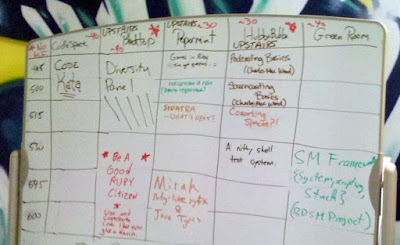After figuring out the class loading thing last week, we released a new version of Mirah(0.0.9) with the workaround so it’ll work on JRuby 1.6.4. Huzzah.
This Sunday, my head was a little groggy from facilitating a code retreat on Saturday (which went awesome). So, I ended up doing more code spelunking and less bug fixing. It’s cool though, because I had some interesting thoughts about some of the stuff I looked at.
Ye Olde Plans
- Fix the test_empty_array test.
- Look at boogs
- After parse callbacks
- ARGV/argv
Bonus
- refactoring???
Arr Boogs Ahoy
test_empty_array: So there was this pull request from a while back that I wanted to wrap up. Seems everybody else saw this test fail except me. Digging a bit, I figured out that there were two test cases used the same class name. Both of them had a test of that name. I changed the class name of one, and saw the error. Then, I merged the patch. Thanks thomaslee.
I spent a little time trying to figure out precisely what the test was supposed to be testing, but I couldn’t see a good way to make it more clear.
More boogs: class variables in class bodies(#113)
I looked at a bug about how class variables don’t seem to work in class bodies. There was a discussion about it on the mailing list last year, and I think we came to an agreement about it, but I don’t know if any of it has been implemented yet. As it is, variables in class bodies seem to do funny things, as you can see in the generated Java
in my comment.
Source Spelunking
From there I dove into the compiler’s source, looking for insight I guess. I wanted to know more about how things worked. I started by focused on looking at how inference works and how the AST and the typer interact. I have to say, I’m still a little confused about it, but I feel more comfortable than I did a year ago, when I first started looking at Mirah’s code.
Inference is done using a visitor pattern. A typer is passed through each node of the AST through the infer method, which takes a typer and a flag that says whether it’s inferring an expression or not. I still haven’t quite figured out what the flag does, but it seems important.
If the typer can’t figure out the type of a particular node on the initial pass, it defers figuring that node’s type til later. I think this allows you to do things like call methods that haven’t been seen by the typer yet.





